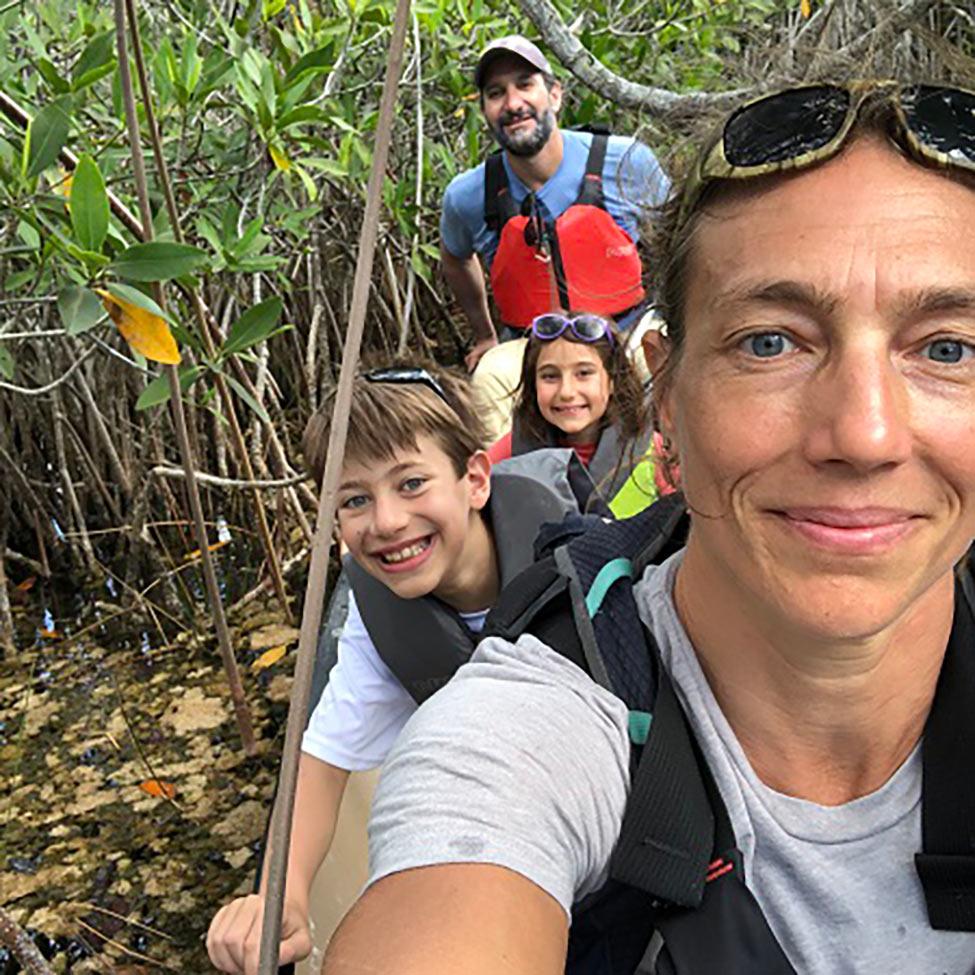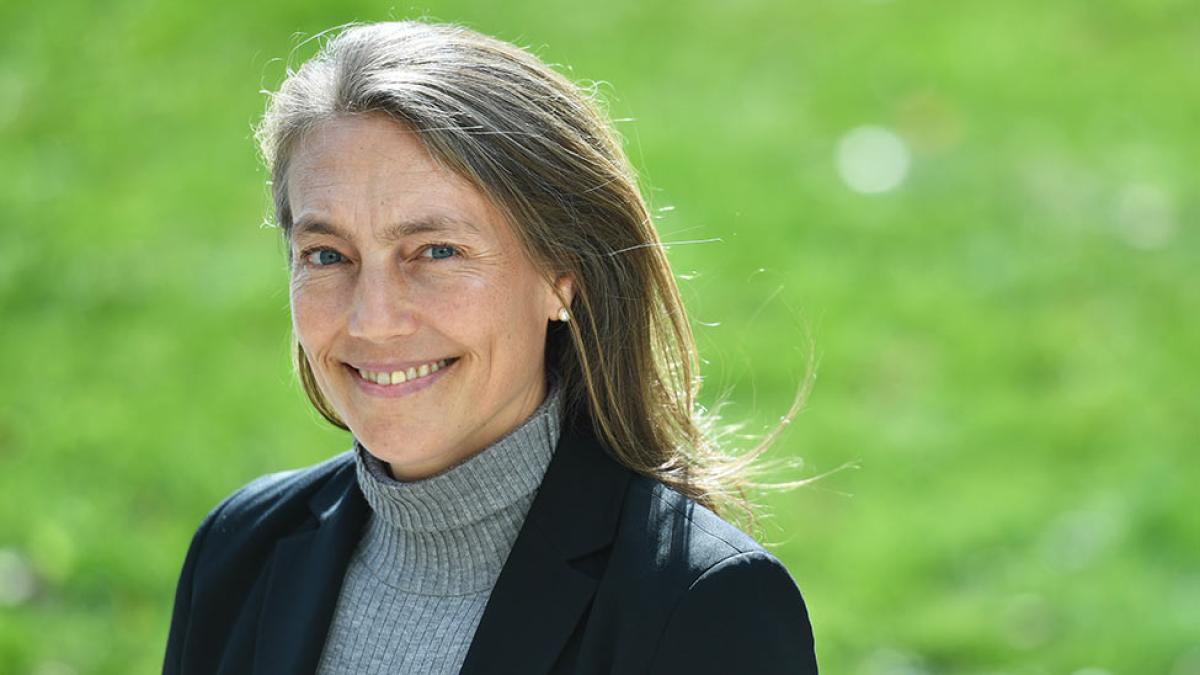
Radio clip from KABC-AM (Radio)
New York city's mayor Eric Adams is set to speak at Pace University's graduation ceremony Monday, though some students don't want him there at least 1300 have signed a petition against the mayor being invited to speak because of disagreements on policy. Mayor Adams doesn't seem to bother by it. That's what New York is you know, and so too easily voice your opinions and beliefs. That's what make New York's great. A spokesperson for pace University defends the mayor calling his story and inspiration the last I recall this morning. 1300 people in Pace so just as we as we have those that would like another speaker at those who are excited about becoming roughly 20000 are expected at the joint ceremony Monday.
Pace University commencement returns in person
For the very first time, graduates from the school's New York City and Westchester County campuses will also take part in the same ceremony.
Faculty Focus: Professor Katrina Kuh
Professor Katrina Kuh joined Haub Law in 2017 and is currently the Haub Distinguished Professor of Environmental Law and serves as the Director of the Environmental Law and Policy Hack Competition. Learn about Kuh’s background, her thoughts on traveling, climate anxiety, and more in this candid Q+A.

An avid long-distance runner, Professor Katrina Kuh has loved the outdoors since she was a child. This passion for the outdoors turned into a passion for the environment, which led Professor Kuh to pursue her JD, and ultimately, a career in environmental law. Professor Kuh joined Haub Law in 2017 and is currently the Haub Distinguished Professor of Environmental Law and serves as the Director of the Environmental Law & Policy Hack Competition. She teaches Administrative Law, Environmental Survey, Climate Change Law, International Environmental Law, and Torts. Learn about Professor Kuh’s background, her thoughts on traveling, climate anxiety, and more in this candid Q+A.

How did you become interested in environmental law and climate change law?
My parents always loved the outdoors. We were often tight on money and camping felt like getting something for nothing. Coupled with the fact that I’m a long-distance runner, I spent a lot of time outside. I spent two summers living and working in Boulder, CO just so I could run there. The single biggest predictor of whether a person will care about environmental issues is whether the person spent time in nature as a child with a trusted adult and that was something we did together often as a family.
In terms of climate change, I wasn’t a visionary. In law school, we all had to satisfy a writing requirement to graduate. My good friend wrote a paper on possibly being able to sue large GHG emitters under nuisance. It was ultimately cited by the Second Circuit Court of Appeals in Connecticut v. EPA. He was a visionary! I only really started to focus on climate change after I started teaching at Hofstra Law School in 2007. They let me develop a seminar and I created a course on climate change law. Every time I teach climate change law, I think that the next time that I teach it, there will surely be a new federal statute focused specifically at GHG reduction, but, alas, I’m still waiting. As a professor, I really love teaching the class. Every time you teach the class you have to rework it because it is constantly changing and evolving.
It’s important to think about worrying that’s productive versus unproductive. The best antidote, for me, is feeling like you’re trying to do something. Working on climate mitigation eases my climate anxiety.
What are some of your other projects you are working on?
I just had an article published in the Marquette Law Review, Informational Regulation, the Environment, and the Public, contributed to a report, Legal Aspects of Climate Change Adaptation. I’m working on a couple of new writing projects as well. I’m working on a law review article with a professor from another school that explores eco-necro tourism, or “last chance” tourism, from a legal perspective. I have previously touched on these issues in a blog post “How to Travel Responsibly in an Era of Climate Change.”
I’m also writing a book chapter focused on environmental aspects of the constitution with James May, a Pace alumnus and visiting scholar, and editing a book based on a project by the Environmental Law Collaborative, Adapting to a 4 C World.
Earlier this year, a book of which I am a co-author came out - “Climate Change Law: An Introduction.” I wrote this with fellow Haub Law Professors Karl S. Coplan, Shelby D. Green, Katrina Fischer Kuh, Smita Narula, Karl R. Rábago (former professor), and Radina Valova. There are many policy makers who don’t have a JD who are finding themselves working on climate policy issues. Even those who do have a JD may not have taken a course specific to climate policy. This book is a punchy, straight to the point introduction to climate change. We wanted to come together to provide an onramp to climate policy in the US. The goal is to define terms, but also get the readers quickly to the legal questions and debates. I will be using it as one of the texts for the Climate Law class at Haub Law moving forward. I even did a Q&A on the book when it came out to go over the basics of it!
At Haub Law you are the Director of the Environmental Law & Policy Hack Competition - can you talk a bit about that?
Yes, we just announced the problem for the next competition, which invites students to propose a private environmental governance initiative. The goal in selecting and drafting the problem is to find an emerging environmental issue that could benefit from a new perspective and is manageable for students to address in a meaningful way in the competition timeframe. We like encouraging interdisciplinary teams and want to encourage students to think about intersections between law and policy.
How do you deal with Climate Anxiety?
I’m a worrier by nature and I struggle with this. I was talking with my kids at dinner and said, jokingly, marry whomever you want, just make sure they’re Canadian, so you can get a Canadian passport. My daughter was sobbing the next morning because she felt it was too much pressure to marry someone Canadian. It’s important to think about worrying that’s productive versus unproductive. The best antidote, for me, is feeling like you’re trying to do something. Working on climate mitigation eases my climate anxiety.
How do you approach travel?
When I travel with my family, I prioritize taking them to special places that will be significantly altered in their lifetimes. We’ve been to the Everglades, Venice, Glacier National Park, glacier skiing in Europe, and to the Galapagos. Over Christmas, I wanted to take my kids to Grande Isle in my birth state - Louisiana. However, due to Hurricane Ida, they’re were not allowing non-residents.
Mayor Adams to Pace U: To Change the World, You Must Protect & Protest
Standing before thousands of graduates at Pace University's Commencement, Mayor Eric Adams today praised the uniqueness of the American Dream and said that in order for it to be realized, people must not only shine a light on injustices facing society, but they must then take action to protect the afflicted and those who are suffering.
Radio clip from WINS-AM
Mayor Eric Adams was one of the speakers today of Pace University's commencement the University's in-person commencement in 3 years. The mayor, received an honorary doctorate and some students at the ceremony at Arthur Ashe Stadium weren't happy about that want to really give honor to those who are standing.
Buffalo mass shooting kills 10
WHERE’S ERIC? Appearing on Univision’s “¡Despierta América!,” speaking at the Security Token Summit 2022, giving a commencement address at Pace University, visiting Netflix Studios in Brooklyn, and making an economic development and education announcement.
CBS 2 News at 6
A welcomed return for Pace University. For the first time in three years, they will hold an in- person graduate ceremony. It's special for another reason. For the first time t graduates from New York City and Westchester campuses will take part in the same ceremony. It's underway at the usual site of the U.S. Open Tennis tournament, the national tennis center in Flushing, Queens. Mayor Adams will the commencement speaker and will receive an honorary doctorate degree.
NY1
Eric Adams, Pace University. He responded telling the audience that he doesn't blame students for protesting. Here's what he said to them. I know protests. This is a picture of me as a state senator. Protesting on the floor of the state's senate after Trayvon Martin was killed. I wore a hoodie. To talk about the loss of this young man. I know protests. Then the mayor is right. I can see him in a different Eric Adams graduating turning his back up over. I think he handled it really well. And I think he's got a good point. But it also shows you how you can go from being someone standing up and turning your back to suddenly being the person gets the back turned to it all turns pretty quickly.
PIX11 Morning News
Pace University will hold its largest ever graduation today to celebrate the classes of 2020 2021. and 2022. Mayor Eric Adams had to deliver a speech when he receives his honorary doctorate degree. The slate of commencement speakers also includes Congressman Grace, Meng. The ceremony will happen this morning at Billie Jean King. National Tennis Center in Queens.
WABC- NY (ABC) - Eyewitness news at 5
Commencement for Pace University and it had a lot of pump. yeah, some protests as well. Mayor Adams giving the commencement address. dozens of students turned their backs on the mayor. The students protested the mayor's policy that they say don't align with the beliefs of the graduating class. Mr. mayors applauded them for standing up for what they believe in. I know a protest, but I'm not giving a degree today because I know how to protest. Let me tell you why I'm getting a degree. I'm getting a degree because after protest you must do something to protect. you cannot simply protest. you have to protest. That is a mantra of his as mayor of today's ceremony, the mayor received an honorary doctorate as he just described.